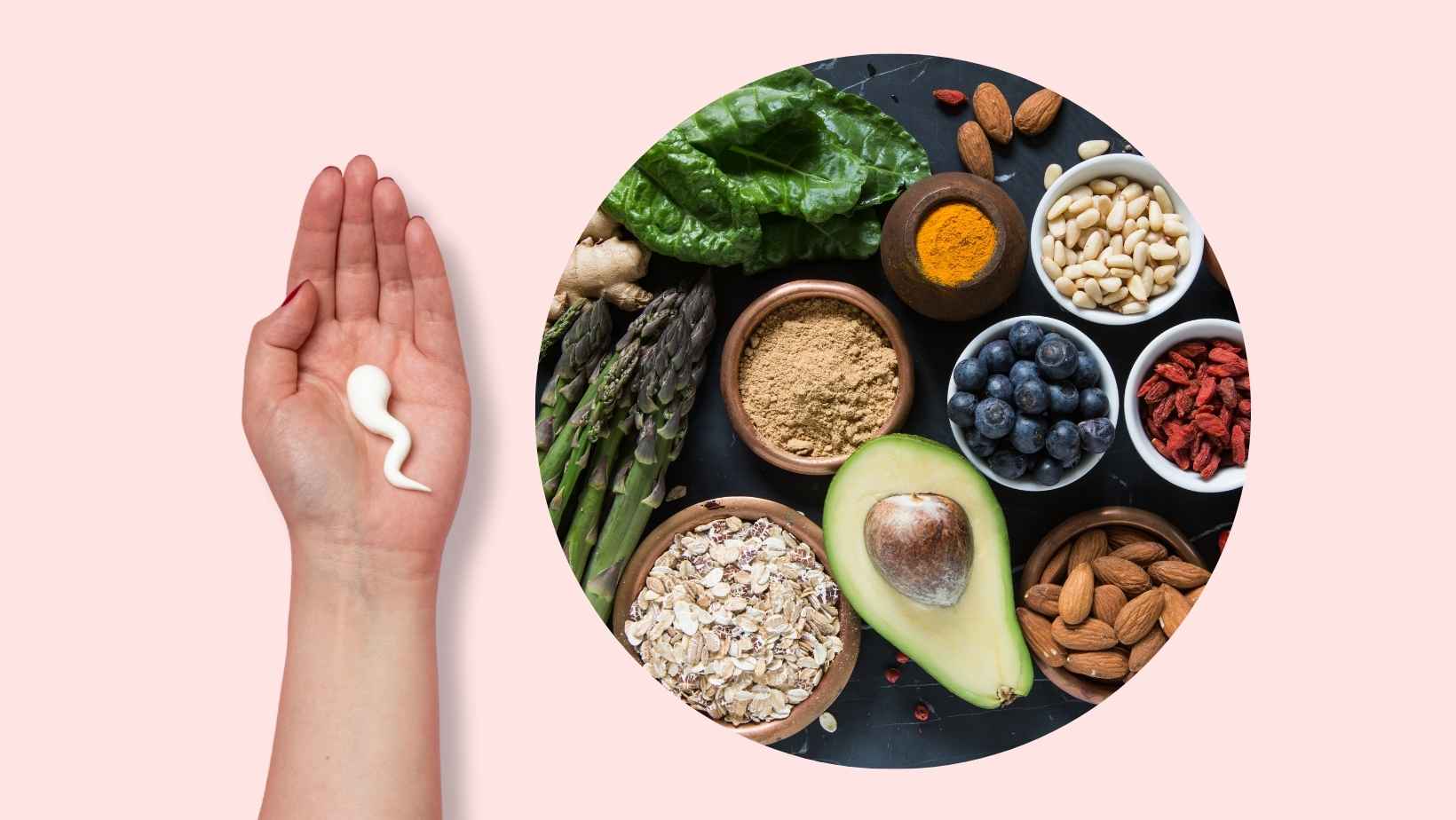
All of you must have heard that smoking or alcohol can affect sperm production in males. However, did you know that certain foods can help to improve your sperm count? YES! Read it once more.
Hi! I am Dr. Jagrati Laad and today I’m here to guide you about the nutrition that can help you to increase sperm count naturally. This is very important because in the journey toward parenthood, a healthy sperm count is paramount.
In my opinion, at least try these foods and then try to conceive. If that does not work then me and my team are always there to guide you in the journey towards parenthood. Join us as we explore the role of nutrition in enhancing sperm count and overall fertility. Before we dive in into the foods that can increase sperm count, let’s discuss sperm count and why is it crucial for conceiving.
Understanding Sperm Count:
Sperm Count Defined:
Sperm count is not just a number; it is a key indicator of male reproductive health. Dr. Jagrati Laad explains that sperm count refers to the total number of sperm present in a semen sample. A healthy sperm count is vital for successful conception, and any deviation from the normal range can impact fertility. Dr. Jagrati Laad emphasizes that it goes beyond being just a numerical value; it serves as a key indicator for successful conception. To comprehend the significance of sperm count fully, let’s explore the normal range and how it is measured.
Normal Range of Sperm Count:
The World Health Organization (WHO) has established a standard reference range for sperm count. According to the WHO guidelines, a healthy sperm count typically falls within the range of 15 million to 200 million sperm per millilitre of semen. This reference range is considered optimal for achieving successful conception.
How Sperm Count is Measured:
Measuring sperm count involves analyzing a semen sample. A semen analysis, also known as a sperm count test, is conducted to assess various parameters related to male fertility.
Here is an overview of the process:
Sample Collection: A semen sample is collected through masturbation into a clean, sterile container provided by the laboratory or clinic. It is crucial to follow the specific instructions given for sample collection to ensure accurate results.
Sample Analysis:
The collected semen sample undergoes a detailed analysis in the laboratory. Technicians examine the sample under a microscope to determine the concentration of sperm, among other factors.
Sperm Count Calculation:
The sperm count is calculated by counting the number of sperm present in one millilitre of semen. This count is then multiplied by the total volume of the ejaculate to obtain the total sperm count for the entire sample.
Assessment of Other Parameters:
In addition to sperm count, the semen analysis assesses other parameters such as sperm motility (movement), morphology (shape), and overall semen volume are considered. These factors collectively provide a comprehensive evaluation of male reproductive health.
Significance of Normal Sperm Count:
Maintaining a sperm count within the normal range is vital for successful conception. A higher sperm count increases the chances of sperm reaching and fertilizing the egg, optimizing the overall fertility potential. On the other hand, a deviation from the normal range may indicate potential fertility issues and warrants further investigation by a fertility expert like Dr. Jagrati Laad.
Impact of Low Sperm Count:
Low sperm count can be a roadblock to conception. Dr. Laad sheds light on how a reduced sperm count may lead to difficulties in fertilizing an egg, affecting the chances of pregnancy. Understanding the factors influencing sperm count becomes crucial for those aspiring to become parents.
Low sperm count, as highlighted by Dr. Jagrati Laad, is not merely a numerical concern; it significantly impacts the process of conception. Understanding the consequences of a reduced sperm count is crucial for individuals aspiring to become parents.
1. Fertilization Challenges:
The primary role of sperm in conception is to fertilize the egg. When there is a low sperm count, the chances of a sperm successfully reaching and fertilizing the egg are diminished. This creates a substantial challenge in the fertilization process, potentially leading to extended periods of trying to conceive without success.
2. Decreased Fertility Potential: A lower sperm count directly correlates with a decreased fertility potential. Dr. Laad explains that the likelihood of sperm successfully navigating the female reproductive tract and reaching the egg is reduced. This decreased fertility potential may prolong the time it takes for a couple to achieve a pregnancy.
3. Impact on Sperm Motility and Morphology:
Besides the quantity of sperm, the quality of sperm is equally important for successful conception. A low sperm count often accompanies issues with sperm motility (movement) and morphology (shape). These factors collectively contribute to a diminished ability of sperm to navigate the female reproductive system and effectively fertilize the egg.
4. Increased Time to Conceive:
Couples facing the challenge of low sperm count may experience an increased duration of attempting to conceive. Dr. Jagrati Laad underscores that the reduced number of sperm available for fertilization elongates the time required for the sperm to encounter and fertilize the egg successfully.
5. Emotional and Psychological Impact:
The journey towards conception can be emotionally challenging for couples dealing with low sperm counts. Dr. Laad emphasizes that the prolonged efforts to conceive, coupled with the uncertainty of success, may lead to emotional stress, anxiety, and feelings of frustration. This emotional toll can further exacerbate the difficulties associated with fertility challenges.
6. Need for Fertility Intervention:
In cases of persistently low sperm count, intervention from fertility specialists may be necessary. Dr. Laad advises that seeking professional guidance becomes essential for couples facing challenges in conceiving due to low sperm count. Fertility treatments, such as in vitro fertilization (IVF) or intrauterine insemination (IUI), may be recommended to enhance the chances of successful conception.
Factors Influencing Sperm Count:
Numerous factors contribute to sperm count, and Dr. Jagrati Laad emphasizes the importance of lifestyle, diet, and the environment. Stress, exposure to toxins, and certain medical conditions can adversely affect sperm production. By making informed choices, individuals can positively impact their reproductive health.
Foods to Increase Sperm Count:
Zinc-Rich Foods:
Dr. Laad highlights the significance of Zinc in sperm production. Foods like oysters, beef, and pumpkin seeds, abundant in Zinc, play a crucial role in promoting healthy sperm development. Including these in your diet can contribute to optimizing sperm count.
Vitamin C-Rich Foods:
Vitamin C is a powerful ally in preventing sperm oxidation and enhancing motility. Dr. Jagrati Laad recommends incorporating citrus fruits, strawberries, and bell peppers into your daily meals for their rich Vitamin C content.
Folate-Containing Foods:
Folate is not just for expectant mothers; it is also essential for sperm health and DNA integrity. Dr. Laad suggests adding leafy greens, legumes, and fortified cereals to your diet to boost folate levels and support optimal sperm function.
Omega-3 Fatty Acids:
Omega-3 fatty acids, found in fatty fish, flaxseeds, and walnuts, offer a host of benefits, including improving sperm quality. Dr. Jagrati Laad explains how incorporating these foods can positively influence sperm health.
Antioxidant-Rich Foods:
Protecting sperm from oxidative stress is crucial, and antioxidants play a pivotal role. Dr. Laad recommends including berries, nuts, and dark chocolate in your diet to harness the power of antioxidants for optimal sperm protection.
Lycopene-Containing Foods:
Lycopene, present in tomatoes and watermelon, is another ally in the quest for improved sperm count and motility. Dr. Jagrati Laad explains how these foods can positively impact male fertility.
Dietary Tips for Improving Sperm Count:
Hydration:
Drinking an adequate amount of water is not only essential for overall health but also plays a role in sperm production. Dr. Laad stresses the importance of staying hydrated to support optimal reproductive function.
Moderation and Balance:
A balanced and varied diet ensures the intake of essential nutrients crucial for sperm health. Dr. Jagrati Laad advises on the importance of moderation and balance in food choices to provide the body with the necessary building blocks for healthy sperm.
Limiting Processed Foods and Sugars:
Processed foods and sugary beverages may hurt reproductive health. Dr. Laad advises on the importance of minimizing their consumption to optimize fertility and sperm count.
Lifestyle Factors That Affect Sperm Count:
Exercise and Weight Management:
Regular exercise and maintaining a healthy weight contribute significantly to sperm count. Dr. Jagrati Laad explains how incorporating physical activity into your routine and managing weight can positively impact male fertility.
Avoiding Harmful Substances: Smoking, excessive alcohol consumption, and illicit drug use can harm sperm count. Dr. Laad emphasizes the need to steer clear of these harmful substances for those looking to enhance their reproductive health.
Well, don’t get disheartened if this does not work for you. There are other medical techniques which can help you to experience the joy of parenthood.
Unlocking Parenthood Possibilities
Explore Donor-Assisted Fertility Solutions at Wombs Fertility & Reproductive Health
Conclusion:
Dr. Jagrati Laad’s expert insights guide us through the intricate relationship between diet, lifestyle, and sperm count. Making gradual dietary and lifestyle changes, as recommended by Dr. Laad, can pave the way for long-term benefits to sperm health. Empower yourself with knowledge and take proactive steps towards a healthier reproductive journey.











